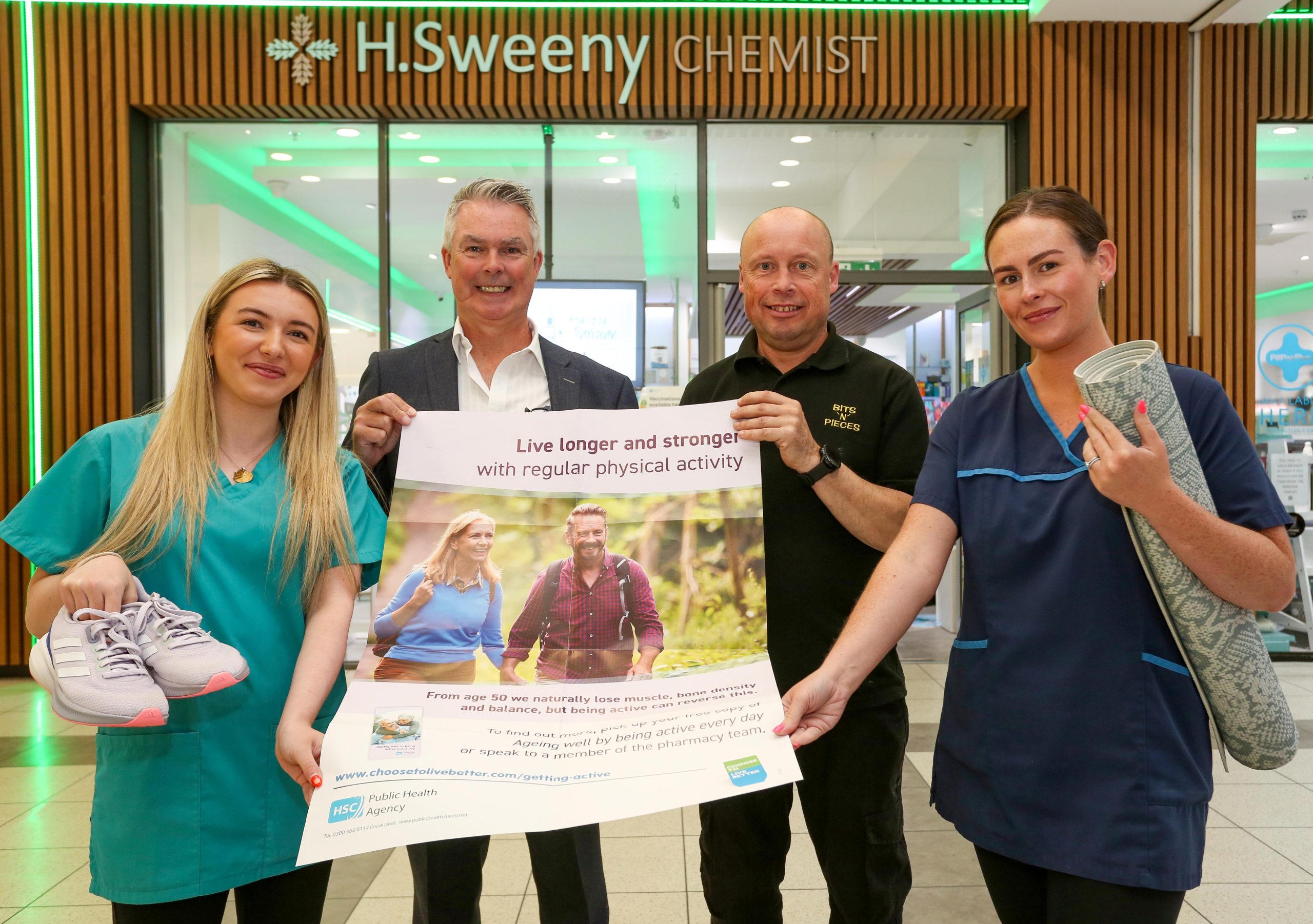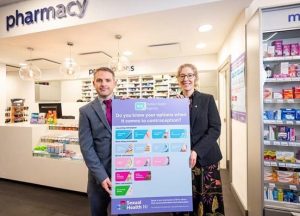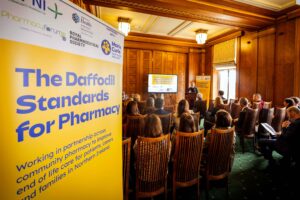
Ageing Well campaign urges people to get active to help live longer and stronger
A new campaign focussing on the importance and benefits of physical activity to help live longer and stronger, has been launched in community pharmacies across Northern Ireland.
The ‘Live longer and stronger’ campaign aims to raise awareness of age-related deconditioning and the importance of physical activity and will run in community pharmacies throughout August and September as part of the Living Well service.
Living Well is offered in over 500 pharmacies across Northern Ireland and provides information and advice on public health issues. It is delivered in partnership with the Public Health Agency (PHA), Community Pharmacy NI (CPNI), and the Department of Health (DoH).
Jeff Scroggie, Health and Social Wellbeing Improvement Manager and Ageing Well Lead at the PHA said: “It is never too late to gain health benefits from physical activity. Ageing is inevitable, but the pace at which physical changes occur can be slowed or even reversed with regular physical activity.
“Including some physical activity into your weekly routine will benefit you mentally as well as increase your quality of life. It can help make you feel happier, keep your brain sharp, prevent falls and help to keep you living independently to enjoy life and activities with friends and family for longer.”
Local Community Pharmacist Killian Johnston from H Sweeny Pharmacy, Quayside Shopping Centre in Derry/Londonderry, welcomed the campaign.
He said: “Community pharmacy is an ideal setting to help encourage people to look after their health by engaging in initiatives such as the Living Well campaigns.
“You are more likely to maintain your independence and overall wellbeing if you have led an active lifestyle and made healthier choices throughout your life. The more time spent being physically active, the greater the health benefits including better sleep.
“Pharmacy teams will be promoting the benefits of physical activity and where possible, signposting to relevant local groups and activities people can take part in. We would encourage patients and customers to call into their local pharmacy to ask for advice and information.”
Gerard Walls, Senior Health and Social Wellbeing Improvement Officer at the PHA, said: “The UK Chief Medical Officers recommend being active for at least two and a half hours each week, including doing activities that can help improve muscle strength and balance at least twice a week. We would recommend breaking up the activity into smaller bouts across the week and limit the amount of time spent being sedentary, such as lying or sitting.
“It is also important to remember that everyone has a different starting point, if this level of weekly activity is not achievable for you, start with light activities, such as walking, try to walk a bit faster than normal, cleaning or gardening is also a good way to try to build up gradually.
“Research shows that from 50 years of age we naturally lose muscle and bone density year on year, but being active can help reverse this.
“Regular physical activity provides physical and mental health and wellbeing benefits, including having a healthier heart and helping to lower the risk of developing conditions like dementia, Type 2 diabetes, stroke and some cancers.
“Even relatively small increases in physical activity can contribute to improved health and quality of life. No matter how active you may be, doing a little more can help. Every movement counts.”
Top tips
- Limit the amount of time spent being sedentary, such as lying or sitting.
- Activities that improve strength and balance, such as carrying heavy shopping bags, yoga or doing exercises that use your own body weight, such as push-ups or wall presses and sit to stands. These activities will help to reduce the risk of falls and help you feel more confident.
- Find out what group activities happen in your local leisure centres, churches or community centres.
- Join a local Walking for Health group. They cater for walkers of all abilities.
- Take a walk with friends, rather than sitting with them for a chat.
- Do some strengthening activities, such as standing up from a chair without using your arms or aided if needed.
- Move around the house. Cleaning and gardening counts as physical activity.
- You could use the time waiting for the kettle to boil to walk up and down the stairs or do some lunges, wall presses or heel raises.
- Work on your balance by standing on one leg while you brush your teeth.
As part of the Living Well campaign, community pharmacies across Northern Ireland are providing free information leaflets.
In addition to the campaign materials, information on ways to get active and advice about how to eat and drink well as we get older is available at www.choosetolivebetter.com
Notes to the editor
- Institute of Public Health (IPH) data* indicates that a third of the population in Northern Ireland (33%) knows the weekly recommendations to do at least two and a half hours of physical activity.
- Women (37%) are more knowledgeable than men (30%) about the weekly recommendations for activity, but are less active. People from lower socioeconomic groupings, were much less likely than those from higher groupings to know the benefits of physical activity for health.
- People who knew the recommendations (37%) were significantly more likely to be active than those who didn’t know (30%). However, when analysed by gender, this association was only true for men and not for women.
- Overall, 28% of people in Northern Ireland were active five days or more per week. One in seven (14%) were inactive. Women were much less likely to be active than men (26% compared to 31%) and women were also much more likely to be inactive (20% women, compared to 14% men).
- Older people aged 65+ were more likely to be inactive than younger people (18-24) in Northern Ireland (20% compared to 15%). At a population level, knowledge of the benefits of physical activity and the consequences of physical inactivity has an association with increased physical activity.
*Sheehan A, O’Sullivan R. Mind the gap – exploring knowledge about physical activity in Ireland and Northern Ireland. Executive summary. Dublin: Institute of Public Health, 2023.





